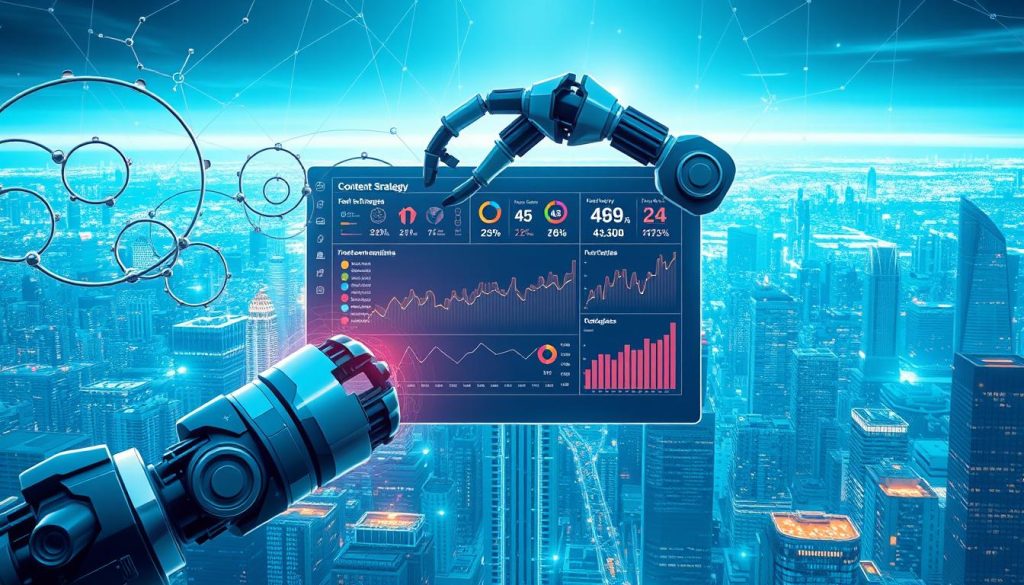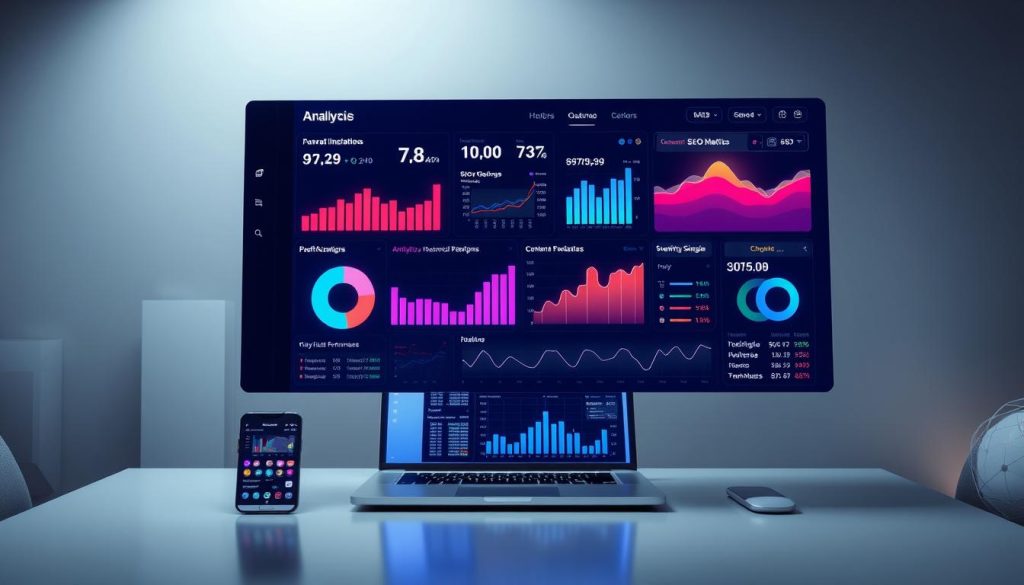Can artificial intelligence really boost your website’s visibility on search engines?
In today’s digital landscape, SEO ranking is crucial for online success. With the rise of AI technology, the way we approach SEO is undergoing a significant transformation.
AI-driven tools are revolutionizing the SEO landscape, making it more efficient and effective. By leveraging AI-powered solutions, businesses can improve their online presence and stay ahead of the competition.
Key Takeaways
- Discover how AI is transforming the SEO landscape
- Learn how to leverage AI-driven tools for better SEO ranking
- Understand the benefits of using AI-powered solutions for SEO
- Explore the future of SEO with AI technology
- Find out how to stay ahead of the competition with AI-driven SEO strategies
The Evolution of SEO in the AI Era
As AI continues to advance, its impact on SEO strategies has become increasingly profound. The way we optimize for search engines is no longer just about keywords and backlinks; it’s about understanding the intricacies of AI-driven algorithms.
Traditional SEO vs. AI-Enhanced SEO
Traditional SEO focused on static keyword optimization and manual link building. In contrast, AI-enhanced SEO leverages machine learning to analyze vast amounts of data, predict user behavior, and optimize content dynamically. This shift has made SEO more sophisticated and effective.
- Improved keyword research with AI insights
- Enhanced content optimization for better user engagement
- Predictive analytics for SEO strategy
Why AI Has Become Essential for Modern SEO
With search engine algorithms becoming increasingly complex, AI has become indispensable for modern SEO. It helps in understanding user intent, personalizing search results, and adapting to algorithm updates. By integrating AI into SEO strategies, businesses can stay ahead of the competition and achieve higher search engine rankings.
How AI Improves SEO Ranking
AI technology is significantly enhancing SEO ranking by improving search engine algorithms. This enhancement allows for more accurate and relevant search results, which is crucial for businesses and individuals seeking online visibility.
AI’s Impact on Search Engine Algorithms
The impact of AI on search engine algorithms is profound. AI systems can analyze vast amounts of data, identify patterns, and make predictions, thereby improving the algorithm’s ability to rank websites.
Google’s AI Systems: RankBrain and BERT
Google’s AI systems, such as RankBrain and BERT, play a crucial role in understanding search queries and providing relevant results. These systems use machine learning to better comprehend the context and intent behind searches.
How Search Engines Use Machine Learning
Search engines utilize machine learning to continuously improve their algorithms. By analyzing user behavior and search patterns, machine learning helps search engines to refine their ranking systems.
Key AI Technologies Driving SEO Performance
Key AI technologies driving SEO performance include natural language processing (NLP) and predictive analytics. NLP helps search engines understand the nuances of language, while predictive analytics forecasts future trends and behaviors.
These technologies, when combined, enable businesses to optimize their SEO strategies more effectively, leading to improved search engine rankings.
Essential AI Tools for SEO Optimization
To stay ahead in the SEO game, leveraging AI tools is no longer a choice but a necessity. The right AI tools can significantly enhance your SEO strategies, leading to better performance and higher rankings.
Content Creation and Optimization Tools
AI-driven content creation and optimization tools are revolutionizing the way we produce and refine content. These tools help in crafting high-quality, engaging content that resonates with the target audience.
AI Writing Assistants
AI writing assistants, such as WordLift and Content Blossom, aid in generating well-structured content by suggesting improvements and alternatives, ensuring that the content is both informative and engaging.
Content Analysis Platforms
Content analysis platforms like Clearscope and Surfer SEO analyze the content against top-ranking pages, providing insights to optimize it further for better SEO performance.
Keyword Research and Analysis Tools
Keyword research is a critical component of SEO. AI-powered tools like Ahrefs and SEMrush offer advanced keyword research capabilities, helping to identify relevant keywords and analyze competitor strategies.
Technical SEO Audit Tools
Technical SEO audit tools, such as Screaming Frog and Sitebulb, utilize AI to crawl websites, identify technical issues, and provide recommendations for improvement, ensuring that the website is technically sound and optimized for search engines.
Implementing AI-Driven Content Strategies
Implementing AI-driven content strategies can significantly enhance your SEO efforts. By leveraging AI technologies, businesses can create more effective content that resonates with their target audience and ranks higher in search engine results.
Creating SEO-Friendly Content with AI Assistance
AI can assist in creating SEO-friendly content by analyzing vast amounts of data to identify trends and patterns. This helps in crafting content that is both relevant and optimized for search engines.
Step 1: Topic Research and Keyword Identification
AI tools can analyze search data to identify relevant topics and keywords. This step is crucial in creating content that addresses the needs and queries of your target audience.
Step 2: Content Generation and Optimization
Once the topic and keywords are identified, AI can assist in generating content. AI algorithms can optimize the content by suggesting the best possible structure, headings, and even the tone to ensure it is SEO-friendly.

Optimizing Existing Content Using AI Insights
AI is not just limited to creating new content; it can also be used to optimize existing content. By analyzing performance data, AI can provide insights into how to improve the content’s SEO.
Content Gap Analysis
AI can perform a content gap analysis to identify areas where your content is lacking. This involves analyzing your existing content against competitors and industry standards to find opportunities for improvement.
Semantic Enhancement Techniques
AI can suggest semantic enhancement techniques to make your content more relevant and comprehensive. This includes adding related keywords, phrases, and concepts to enhance the content’s semantic value.
By implementing these AI-driven content strategies, businesses can not only improve their SEO ranking but also create more engaging and relevant content for their audience.
Leveraging Machine Learning for Competitive Analysis
In the ever-evolving landscape of SEO, leveraging machine learning for competitive analysis has become a game-changer. By harnessing the power of AI, businesses can now gain deeper insights into their competitors’ strategies and make data-driven decisions to improve their own SEO performance.
Identifying Competitor Strategies Through AI
Machine learning algorithms can analyze vast amounts of data to identify patterns and trends in competitor behavior. This includes analyzing keyword strategies, content types, and link building tactics. For instance, AI tools can help identify gaps in the market that competitors are exploiting, allowing businesses to adjust their strategies accordingly.
By understanding competitor strategies, businesses can refine their own SEO approaches to stay competitive. This involves using AI-driven insights to inform content creation, optimize on-page elements, and develop more effective link building campaigns.
Turning Competitive Insights into Actionable SEO Tactics
Once competitor strategies are identified, the next step is to turn these insights into actionable SEO tactics. This involves using machine learning to analyze the effectiveness of different SEO strategies and identify areas for improvement. For example, AI can help determine the most effective content formats, optimal keyword densities, and the best times to publish content.
A table summarizing key competitive insights and corresponding SEO tactics could look like this:
| Competitive Insight | SEO Tactic |
|---|---|
| Competitor’s high-ranking content is long-form and heavily optimized for specific keywords. | Create comprehensive, keyword-rich content to compete for the same rankings. |
| Competitors are using a particular type of content format (e.g., videos, infographics) effectively. | Incorporate similar content formats into your SEO strategy. |
| Competitors have a strong backlink profile from authoritative sites. | Focus on acquiring high-quality backlinks through guest posting, resource pages, etc. |
By leveraging machine learning for competitive analysis, businesses can enhance their SEO strategies and stay ahead of the competition. As noted by
“The future of SEO is not just about optimizing for search engines, but about understanding the complex interactions between users, content, and technology.”
This emphasizes the importance of using AI to gain a deeper understanding of the competitive landscape and make informed decisions.
Measuring SEO Success with AI Analytics
In the era of AI, understanding SEO success requires a deep dive into analytics. AI-driven tools provide comprehensive insights into various aspects of SEO performance, enabling businesses to make data-driven decisions.
Key Performance Indicators to Track
To measure SEO success effectively, it’s crucial to track the right KPIs. AI analytics help in identifying and monitoring these indicators.
Traffic and Engagement Metrics
AI tools can analyze vast amounts of data to provide insights into website traffic and user engagement. Metrics such as page views, bounce rates, and average session duration are crucial for understanding user behavior.
Conversion and Revenue Impact
Moreover, AI analytics can correlate SEO efforts with conversion rates and revenue. By tracking these metrics, businesses can understand the direct impact of their SEO strategies on their bottom line.
| Metric | Description | Importance |
|---|---|---|
| Page Views | Total number of pages viewed by users | High |
| Bounce Rate | Percentage of users who leave without interacting | Medium |
| Conversion Rate | Percentage of users who complete a desired action | High |
Using AI to Predict Future SEO Trends
AI’s predictive capabilities allow businesses to forecast future SEO trends. By analyzing historical data and current patterns, AI can help businesses stay ahead of the competition.

Overcoming Challenges in AI-Powered SEO
As AI continues to transform the SEO landscape, businesses must navigate the challenges that come with AI-powered SEO strategies. While AI offers numerous benefits, such as improved keyword research and content optimization, it also presents several obstacles that can impact its effectiveness.
Common Pitfalls and How to Avoid Them
One of the common pitfalls of AI-powered SEO is over-reliance on automation. To avoid this, businesses should ensure that AI tools are used to supplement human expertise, rather than replacing it entirely. Another pitfall is data quality issues, which can be mitigated by ensuring that data used to train AI models is accurate and up-to-date.
- Regularly audit AI-generated content to ensure it meets quality standards.
- Use AI tools to analyze competitor strategies and identify gaps in the market.
Balancing AI Automation with Human Expertise
To get the most out of AI-powered SEO, businesses must strike a balance between AI automation and human expertise. This can be achieved by using AI to handle repetitive tasks, such as data analysis, while reserving human creativity for tasks that require original thought.
By finding this balance, businesses can harness the power of AI to improve their SEO ranking while maintaining the nuance and creativity that human expertise provides.
Conclusion: The Future of AI in SEO
As we’ve explored throughout this article, AI is revolutionizing the SEO landscape. By understanding how AI improves SEO ranking, businesses can stay ahead of the competition and drive more qualified leads to their websites.
Machine learning for SEO optimization is no longer a luxury, but a necessity. As search engines continue to evolve, AI-driven strategies will become increasingly important for achieving and maintaining high search engine rankings.
By embracing AI-powered SEO tools and techniques, businesses can unlock new opportunities for growth and stay ahead of the curve. Whether it’s through content creation, keyword research, or technical SEO audits, AI is transforming the way we approach SEO.
As we look to the future, it’s clear that AI will continue to play a vital role in shaping the SEO landscape. By staying informed and adapting to the latest AI-driven trends and technologies, businesses can ensure they’re well-positioned for success in the ever-changing world of search engine optimization.
FAQ
How does AI improve SEO ranking?
AI improves SEO ranking by analyzing vast amounts of data, identifying patterns, and making predictions about user behavior, allowing for more effective optimization strategies.
What is the role of machine learning in SEO?
Machine learning plays a crucial role in SEO by enabling search engines to understand the context and relevance of content, and by providing insights that can inform optimization strategies.
How can AI-driven SEO strategies enhance content creation?
AI-driven SEO strategies can enhance content creation by identifying relevant topics, optimizing content for keywords, and analyzing user engagement to refine content approaches.
What are some essential AI tools for SEO optimization?
Essential AI tools for SEO optimization include content creation and optimization tools, keyword research and analysis tools, and technical SEO audit tools that leverage AI and machine learning.
How can AI be used to predict future SEO trends?
AI can be used to predict future SEO trends by analyzing historical data, identifying patterns, and making predictions about future search engine algorithm updates and user behavior.
What are the benefits of using AI for competitive analysis in SEO?
The benefits of using AI for competitive analysis in SEO include identifying competitor strategies, analyzing competitor strengths and weaknesses, and informing actionable SEO tactics to gain a competitive edge.
How can AI analytics be used to measure SEO success?
AI analytics can be used to measure SEO success by tracking key performance indicators such as traffic, engagement, conversion, and revenue impact, and by providing insights to refine SEO strategies.
What are some common pitfalls to avoid when implementing AI-powered SEO?
Common pitfalls to avoid when implementing AI-powered SEO include over-reliance on automation, neglecting human expertise, and failing to monitor and adjust AI-driven strategies.
How can AI-driven content strategies be implemented effectively?
AI-driven content strategies can be implemented effectively by using AI assistance for topic research, content generation, and optimization, and by leveraging AI insights to refine content approaches.

